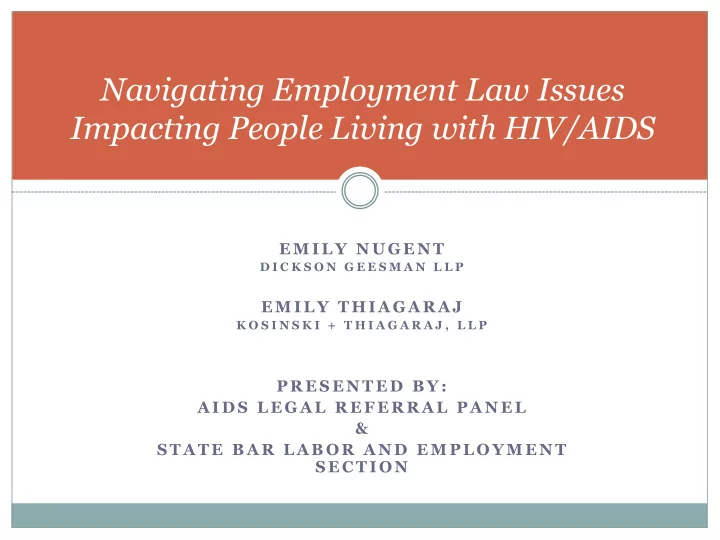

Navigating Employment Law Issues Impacting People Living with HIV/AIDS E M I L Y N U G E N T D I C K S O N G E E S M A N L L P E M I L Y T H I A G A R A J K O S I N S K I + T H I A G A R A J , L L P P R E S E N T E D B Y : A I D S L E G A L R E F E R R A L P A N E L & S T A T E B A R L A B O R A N D E M P L O Y M E N T S E C T I O N
This Presentation Reasonable Accommodations and Interactive Process Medical Leaves of Absence Privacy Concerns
Reasonable Reasonable accommodation means Accommodations employers have an affirmative duty to & Interactive accommodate disabled workers Process The duty to reasonably accommodate Rights and Obligations of only applies to "known" physical or Employer and mental impairments Employee Generally, the individual should notify the employer that accommodation is needed, especially when a disability is less obvious
Reasonable Accommodation Standard ADA & FEHA Whether the employee The employee must show that accommodation is can perform the essential possible functions of the job with or without reasonable Once it's determined that accommodation is accommodation possible, the burden is on "Essential functions" the employer to make the means the fundamental accommodation or show job duties of the that it's unreasonable or position—it does not imposes a risk of harm to include marginal the health and safety of functions of the position others
Types of Reasonable Accommodations Making facilities readily accessible to and usable by disabled individuals Job restructuring Offering part-time work or modified schedules Reassigning to a vacant position Acquiring or modifying equipment or devices Allowing assistive animals on the worksite Providing additional training Providing paid or unpaid leave for treatment and recovery
The Interactive Process FEHA requires employers to engage in a "timely, good faith, interactive process" with the employee or applicant in response to a reasonable accommodation request Employers are liable for failing to engage in the IAP in good faith and face liability under the if a reasonable accommodation is possible Ninth Circuit held that the IAP obligation imposes a continuing obligation to consider alterative accommodations if a presently implemented accommodation is ineffective EEOC requires that "the employer must make a reasonable effort to determine the appropriate accommodation. The appropriate reasonable accommodation. The appropriate reasonable accommodation is best determined through a flexible, interactive process that involves both the employer and the individual."
The Interactive Process Cont. Employer Obligations Grant the requested accommodation, or reject it after due consideration, and initiate the discussion with the applicant or employee regarding alternative accommodations When the disability is not obvious, and the individual has not already provided the employer with reasonable medical documentation confirming the existence of the disability and the need for accommodation, the employer may require the individual to provide medical documentation Once the employer recevies medical documentation, it cannot ask the individual about the underlying cause of the disability
The Interactive Process Cont. Employee/Applicant Obligations Cooperate with the employer in good faith, including by providing reasonable medical documentation where the disability or the need for accommodation is not obvious and is requested by the employer When necessary to advance the IAP, reasonable medical documentation may include a description of physical or mental limitations that affect a major life activity that must be met to accommodate the employee Direct communication is preferred, but not required
Triggering the IAP Employer becomes Individual with a aware of the need known disability for accommodation requests through a third reasonable party accommodations Employer becomes aware because the Employer becomes individual aware of the need exhausted leaves for accommodation under by observation CFRA/FMLA or workers' comp
CASE STUDY #1
LEAVES OF ABSENCE
Medical Leave Entitlements California Family Rights Act (CFRA) Family and Medical Leave Act (FMLA) Employer Disability Leave Policy *Kin Care Leave
Types of Pay While on Leave Accrued Sick Leave, Vacation Leave or Accrued Time Off Employer Disability Leave/CBA Leave State Disability Insurance Paid Family “Leave” (PFL) *Workers’ Compensation
PRIVACY CONCERNS Legal Unauthorized Obligation to HIPAA Disclosure Disclose Inadvertent Public or Improper disclosure of Disclosure private facts
When can employer ask medical questions? If employer has affirmative action for people w/disabilities and all employees asked same question. Whether to respond is employee choice. When requesting reasonable accommodation, but there are limits to questions employer can ask. After job offer made, but before employment begins, so long as everyone offered job in same category is asked same question. On the job if there is objective evidence employee may be unable to do job or pose a safety risk because of condition. (Employer cannot rely on myths or stereotypes to conclude inability to do job or employee poses a safety risk.)
CASE STUDY #2
Recommend
More recommend